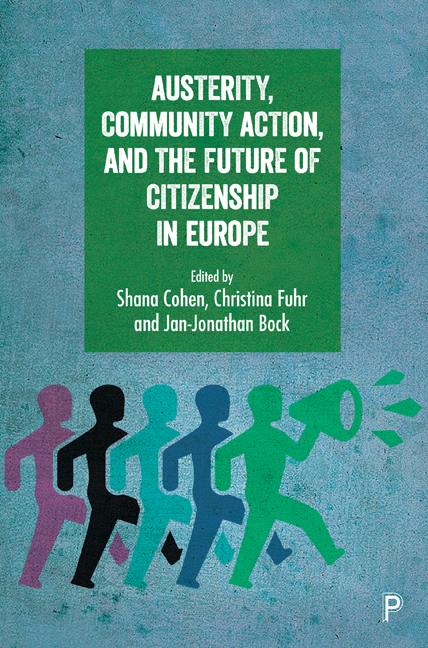Book contents
- Frontmatter
- Dedication
- Contents
- Acknowledgements
- Notes on contributors
- one Introduction: social activism, belonging and citizenship in a period of crisis
- Part I The social consequences of welfare policy
- Part II The practice of social good
- Part III Social change and neoliberalism
- Part IV Situating solidarity in perspective
- Index
Seven - Finding employment and living a good life in London
Published online by Cambridge University Press: 05 April 2022
- Frontmatter
- Dedication
- Contents
- Acknowledgements
- Notes on contributors
- one Introduction: social activism, belonging and citizenship in a period of crisis
- Part I The social consequences of welfare policy
- Part II The practice of social good
- Part III Social change and neoliberalism
- Part IV Situating solidarity in perspective
- Index
Summary
London, like all big cities, has a reputation for being a place of professional opportunity where it is possible to achieve social mobility. For the low-skilled population and those with low educational attainment, such aims, however, are difficult to achieve. Although there are many jobs available, a number of these now offer belowaverage pay, operate zero-hour or flexible work contracts, and provide no opportunities for progression, which renders the attainment of an income that guarantees adequate living conditions nearly impossible. The consequences of a growing conflict between living costs and earning opportunities often lead to debt, food poverty and homelessness, followed by more personal and social issues. The issue is exacerbated for long-term unemployed people and those with mental health issues. Even if they succeed in gaining employment, adjusting to the new routine of such contracts, with their shift work and flexible hours, can be difficult.
Pecan started in 1989 with a mission to support people, especially those with difficulties, into employment. The difficulties clients face may be related to education, confidence, mental health, age, criminal convictions or many other factors. For over 25 years, Pecan has worked with the people of Peckham, a long-term disadvantaged area of London. The charity was created by a group of local churches adamant that they wanted to meet the needs of the area. This desire was especially acute following riots in the neighbourhood during the late 1980s. The riots were an outpouring of feeling of being left alone by the government. People felt forgotten and blamed for the social and economic situation. Our goal has remained the same when addressing the employment needs of the community: supporting people to build their self-belief.
In this chapter, I describe how unemployed people often struggle to find jobs in London due to a lack of self-esteem and social isolation, or because of difficulties arising from changing life circumstances. I also illustrate the structural difficulties posed by labour and housing market policies in achieving social mobility. The chapter thereby argues that while Pecan does its best to help people find and stay in employment by providing expert advice and emotional support, the structural difficulties posed by labour and housing market changes, which result in income and housing insecurities, can prevent people from shifting to a more stable position in their lives.
- Type
- Chapter
- Information
- Austerity Community Action and the Future of Citizenship , pp. 115 - 130Publisher: Bristol University PressPrint publication year: 2017

